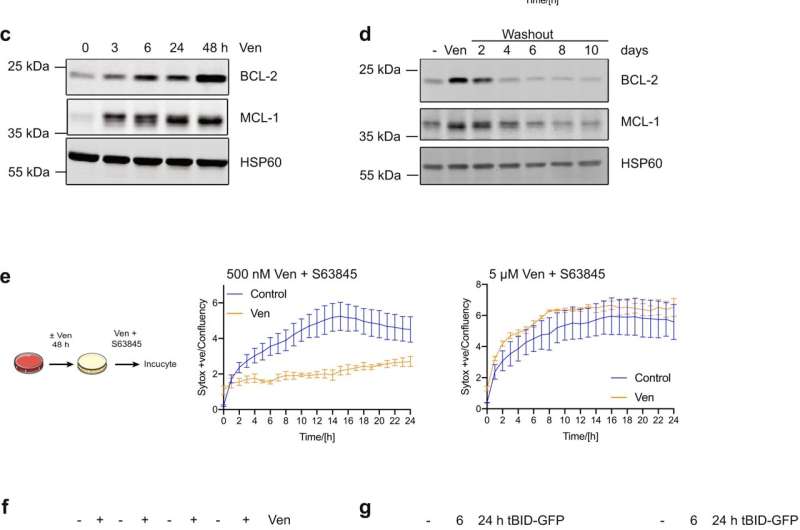Cancer cells resist chemotherapy by helping their neighbors cheat death

Glasgow scientists have uncovered important information about how cancer cells become resistant to certain treatments, according to research published in Nature Communications.
Scientists at the University of Glasgow and Cancer Research UK Beatson Institute have found that dying cancer cells release a protein called FGF2, which helps neighboring cancer cells temporarily cheat death and gives them the opportunity to regrow into new drug-resistant tumors.
The scientists believe that this crucial information could help make chemotherapy more effective, reducing the chances of relapse in cancer patients.
In the lab, the scientists tested cancer cells with a drug called venetoclax, which stops cancer from growing by activating the cell's self-destruct mechanism, known as programmed cell death. Venetoclax is commonly used to treat chronic lymphocytic leukemia (CLL) and acute myeloid leukemia (AML).
The scientists found that adding dead cancer cells, which had been given venetoclax, to live cancer cells resulted in those live cancer cells becoming resistant to the drug. They identified that FGF2 was responsible for protecting the live cancer cells from death caused by venetoclax. Further experiments showed that removing FGF2 made the cells susceptible to the drug again.
Professor Stephen Tait from the Cancer Research UK Beatson Institute, who led the research, said: "Drug resistance is a major complication in many different types of cancer. Our study has shown for the first time how cancer cells can become resistant to treatment and how we can overcome that resistance.
"Cancer will take every opportunity it can find to cheat death, but we believe we can stop it from escaping by using existing treatments more effectively."
Interestingly, when the scientists looked at tissue samples from cancer patients and examined the levels of FGF activation in those samples, they found that those patients with higher levels of FGF activation were given a poorer prognosis by their doctor. This finding suggests a potential link between the cancer's ability to cheat death and the patient's chances of long-term survival.
Professor Tait said: "Understanding how drug resistance builds in cancer will allow us to use existing treatments more effectively, as well as helping us to develop new treatments that minimize the chance of cancer coming back.
"Further research is needed to confirm the clinical significance of our findings, but we believe our research could help us target treatments more effectively to the characteristics from each patient's tumor."
Leukemia is the 12th most common cancer in the UK. There are around 9,907 new cases in the UK each year.
Graeme Sneddon, Cancer Research UK spokesperson for Scotland, said: "This research increases our understanding of how drug resistance develops in cancer at a cellular level.
"It shows for the first time how cancer cells can temporarily cheat death and regroup, with significant implications for how we use chemotherapy. With this vital information, we can stop cancer from fighting back by smarter use of existing treatments.
"Further studies are now needed in patients to see which drug combinations and doses work best to overcome potential resistance and help more people survive cancer."
More information: Florian J. Bock et al, Apoptotic stress-induced FGF signalling promotes non-cell autonomous resistance to cell death, Nature Communications (2021). DOI: 10.1038/s41467-021-26613-0



















